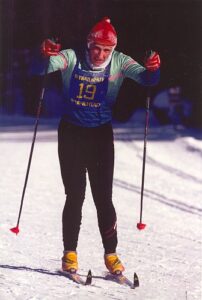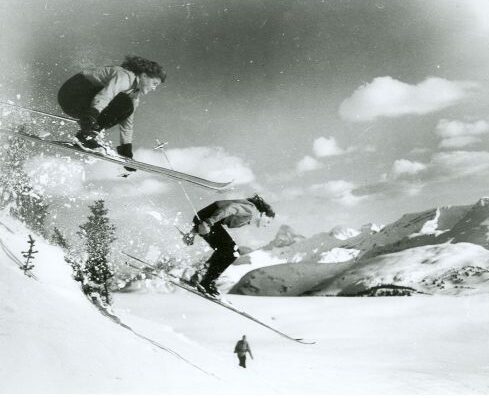Hall of Famer
Richard Weber
Born in Edmonton in 1959, Richard Weber was on cross-country skis at the age of two and actively competing in Nordic events from the age of six. At the age of 18, he was selected to join the Canadian National Cross-Country team and by the time he retired, seven years later in 1985, he had won 20 national titles and represented Canada at four World Championships. While attending the University of Vermont, graduating in 1985 with a degree in Mechanical Engineering, he was named “All American” in 1982 and 1984, and broke the Vermont State Cross- Country Running record.
In March 1986, he joined the Steger International Polar Expedition to replicate the 1904 feat of Robert E Peary using dog-teams to reach to the North Pole without outside help or re-supply. Setting off from Ellsmere Island the expedition experienced a harrowing and hazardous journey of some 800 kms reaching the pole after 55 days. As Wilbur Garrett, Editor of National Geographic noted at the time “… to reach the Pole on your own is still the terrible test of human will, intelligence and physical condition that it was when Peary, Cook, Nansen, Amunsden and others were vying to be the first to reach it”.
In 1988, he was selected to join a joint Russian Canadian expedition, the Arctic Transpolar Ski Expedition, more commonly known as the Polar Bridge Expedition, to traverse the Arctic on skis from Cape Arktichesky in the Siberian islands of Severnaya/Zemlya and ending at Canada’s Ward Hunt Island at the northern tip of Ellesmere Island, a distance of 1730 kms that was accomplished in 85-days.
In the words of Canada’s Prime Minister Brian Mulroney,”… the expedition captured the hearts and imaginations of both Soviets and Canadians, forging a higher degree of cooperation and understanding between the two nations”. Such was the prestige of this expedition that it also received messages of congratulations and best wishes from Soviet President Mikhail Gorbachev and Queen Elizabeth II. Subsequently, on January 9, 1989 at a ceremony in St Catharine’s Hall in the Kremlin, Richard Weber received the Order of Friendship of Nations medal from Soviet Prime Minister, Nikolai Ryzkov, a rare event that required a law to be passed by the Soviet parliament to allow the award to be given to a foreign national.
On March 5, 1992, accompanied by Misha Malakhov, a Russian thoracic surgeon, and Bob Mantell, Richard Weber set off to try to reach the North Pole and return using only human resources with no outside help or resupply. Mantell returned to Ward Hunt island on April 18th in order not to jeopardize the progress of the team while the remaining two pressed on for an unprecedented 102 days before open water forced them to abandon the effort and be airlifted to safety. Undeterred, they attempted the feat again in 1995 and in spite of poor conditions generally, abnormally high temperatures and open water, they were successful. As such, they became the only people to ski to the North Pole four times and the only team to ski unsupported and back in what was described at the time as “…the greatest feat in Polar history”.
Not content with skiing to the North Pole, in March/April 2006, using only snowshoes, he successfully completed the arduous 880 km journey yet again accompanied by British explorer, Conrad Dickinson. Their trek lasted 52 days.
He has received a number of awards for his achievements including the UNESCO “International Fair Play” award for his participation in the Polar Bridge expedition (1989); Medal for Personal Courage from Russian President, Boris Yeltsin (1993), Confederation Medal from the Government of Canada (1993).
Partial Competitive Record
1975
1st place, 7.5 cross-country event, Canadian Junior Championships
2nd place, 3 x 5.0 km cross-country relay event, Canadian Junior Championships
1976
1st place, 5.0 km cross-country event, Canadian Junior Championships
1st place, 7.5 km cross-country event, Canadian Junior Championships
1978
2nd place, 10.0 km cross-country event, Canadian Junior Championships
3rd place, 15.0 km cross-country event, Canadian Junior Championships
1979
1st place, 10.0 km cross-country event, Canadian Junior Championships
1st place, 15.0 km cross-country event, Canadian Junior Championships
2nd place, 3 x 5.0 km cross-country relay event, Canadian Junior Championships
2nd place, 3 x 10.0 km cross-country relay event, Canadian Senior Championships
1980 1st place, 3 x 10.0 km cross-country relay event, Canadian Senior Championships
1981
1st place, 3 x 10 km cross-country relay event, Canadian Senior Championships
1st place, 20.0 km cross-country/shooting event, Canadian Biathlon Championships
1982
2nd place, 30.0 km cross-country event, Canadian Senior Championships
1st place, 50.0 km cross-country event, Canadian Senior Championships
1st place, 3 x 10.0 km cross-country relay event, Canadian Senior Championships
1983
1st place, 10.0 km cross-country relay event, Canadian Senior Championships
1985
3rd place, 50.0 km cross-country event, Canadian Senior Championships
He also represented Canada at the 1977 and 1979 World Junior Cross- Country Championships and the 1982 and 1985 World Cross-Country Championships.
Please Note: The ski information gathered here is compiled from a number of sources; it may not be inclusive of all accomplishments.
Copyright © 2021, Canadian Ski Museum. For Personal/Educational use only. All Rights Reserved.

Keith Nesbitt, Canadian Ski Museum Chair, with Inductee Richard Weber at 1997 Canadian Ski Hall of Fame Induction Ceremony. CSHFM Collection.
SUBSCRIBE
